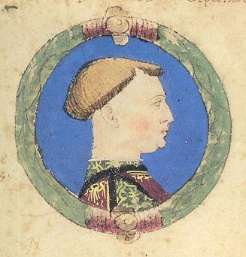Ugo d'Este
Ugo d'Este, also known as Hugh Aldobrandino (1405 – Ferrara, May 21, 1425), was the son of Niccolò III d'Este and his lover Stella de' Tolomei.

Early life
Although he was illegitimate, he was destined to succeed his father as Nicholò's eldest son.[1]
His father never married his mother; but in 1418 married Parisina Malatesta, nearly twenty years his junior. Ugo was at first treated coldly by his young stepmother, who was almost his own age.[2]
Fatal relationship
In 1424, during a trip with his stepmother, they developed an improper relationship that went on even when the two returned to Ferrara.[2][3] Other sources report a different beginning to the affair: to escape the plague of 1423, they took refuge in the castello di Fossadalbero and there in the small castle their relationship was born.[4]
A maid reported the affair to Nicholò, who spied on the lovers and had them imprisoned in the castle where they were sentenced to death by decapitation.[4]
The tragic story has inspired several writers and musicians. The Renaissance Italian author Matteo Bandello wrote the novel Ugo and Parisina, Edward Gibbon told this story in his Miscellaneous Works, and George Byron wrote the poem Parisina in 1816. A libretto by Felice Romani after the English poem was set to music by Gaetano Donizetti in 1833 as Parisina. Pietro Mascagni composed a tragic opera Parisina based on the lyric tragedy written by Gabriele D'Annunzio in 1912 as another adaptation of Byron's poem. There is also a lesser-known opera by Tomás Giribaldi (1878) and a tragedy by Antonio Somma.
After Hugh's death, his younger brother Leonello,[5] also a son of Stella, succeeded his father. Another younger brother, Borso, also later became ruler of Ferrara.
References
- "Archived copy" (PDF). Archived from the original (PDF) on 2011-07-21. Retrieved 2011-05-14.CS1 maint: archived copy as title (link)
- "Fatti, miracoli e leggende di Ferrara antica". Parente.fe.it. Retrieved 2017-04-25.
- "Parisina and the Playing Cards". Trionfi.com. 2010-08-08. Retrieved 2017-04-25.
- "Archived copy". Archived from the original on 2012-12-15. Retrieved 2012-12-15.CS1 maint: archived copy as title (link)
- "Archived copy". Archived from the original on 2007-03-12. Retrieved 2007-03-12.CS1 maint: archived copy as title (link)